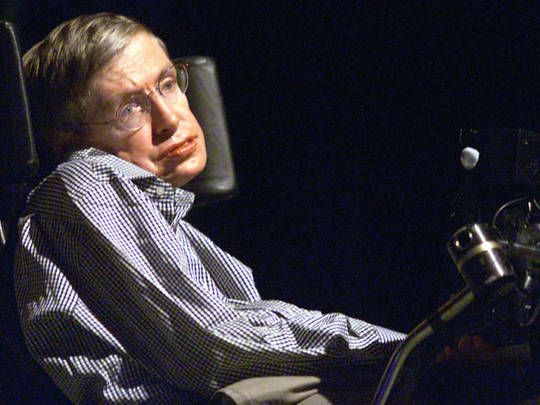
With science and fact having a bit of a hard time of late, boosted by high-profile people in the public eye slamming anything that has a factual basis and ridiculing scientists and professionals who write news for a living, we needed intellectual giants such as Stephen Hawking to continue being a champion for knowledge and learning.
The English scientist died last Wednesday morning surrounded by loved ones in his home in Cambridge. He was a leading figure in the scientific world, who overcame a multitude of challenges to become a global celebrity — one who even appeared on TV, in the American sitcom The Big Bang Theory.
Hawking was born with motor neurons disease, a debilitating condition that caused his body to deteriorate, yet his mind remained a powerful instrument, and he used this tool to explore physics and navigate the universe. Hawking attempted to bring physics to the layperson through his first book, A Brief History of Time, which discusses black holes and the big bang with the non-expert in mind. As someone who tried to read the book, I found it a struggle to grasp some of the ideas and the explanations. I don’t doubt the work of scientists such as Hawking and Albert Einstein though. Even though we can’t feel and see something does not mean it isn’t there. But the evidence must be found that supports such theories, bringing them closer to the truth. Theoretical science is not my forte, although I can appreciate the brilliant minds of those for whom it is. I am amazed at the sight of a rainbow and can imagine the science behind it rather than believe it might be caused by a supernatural element. Even though I don’t understand the inner workings of the rainbow and the different particles that produce the beautiful colourful phenomenon before my eyes, I have a great respect for those who search out that information. And for me, knowing the science behind a natural phenomenon does not strip away the ‘magic’ of it but merely gives an understanding of it. For me, rainbows will remain a wondrous part of the natural world.
Hawking took his thoughts, theories and imagination to the outer world — investigating the universe and black holes; theoretical science that puts parts of different puzzles together to try and make sense of the physicality of that which is beyond our understanding, for now.
The urge to find answers is what set Hawking and sets thousands of other scientists apart. Their work pushes us towards greater understanding of who we are, why are we here and what the future could hold (Hawking also discussed the possibility of time travel in one of his books — a fantasy of many mere mortals).
Hawking’s life is an inspiration in human ingenuity and determination. Think of what we as a species didn’t know a hundred years ago. Perhaps at some point in history humans thought rainbows were a sign that something was about to happen, something extraordinary, or terrifying — or maybe just rain. But we know much more today than at any other time in history thanks to minds such as Hawking’s. Looking up to the stars can give us a feeling of insignificance in the vast and expanding universe, but Hawking’s life can inspire us to keep looking and to be curious as to what is ‘out there’ in the universe and how we as a human species came to be.
Answers to questions such as this can bring a peace to our minds, a peace that tunes out the daily distractions and mundanities of everyday life, perhaps helping us reach a level of what some might call enlightenment.
Christina Curran is a freelance journalist based in Northern Ireland.









